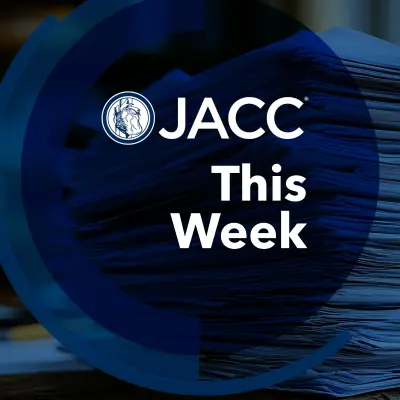
JACC This Week
381 episodes Last Updated: Jun 24, 25
Weekly summary and focused insights of the high-impact cardiovascular research published in the JACC from Editor-in-Chief Harlan M. Krumholz, MD, SM, FACC, shaping cardiovascular care today.
Episodes
Hosts Mitsuaki Sawano, MD, Kentaro Ejiri, MD, and Nobuhiro Ikemura, MD, welcome Yuki Obayashi, MD, of Leiden University Medical Center, to discuss findings from the STOPDAPT-3 trial. Dr. Obayashi highlights that, among ACS patients—including those with HBR or STEMI—aspirin and clopidogrel monotherapy after 1 month of DAPT resulted in similar rates of ischemic and bleeding events. These results support flexible, patient-centered antiplatelet strategies beyond the acute phase.
As the podcast series created by Editor Emeritus Valentin Fuster, MD, PhD, MACC, comes to an end and the new series from current Editor-in-Chief Harlan M. Krumholz, MD, SM, FACC is launched, JACC is pleased to feature an interview between the two legendary thought leaders, discussing the past and future of the journal's podcasts. The interview honors Dr. Fuster for his enduring contributions to the JACC podcast, highlighting his dedication, consistency, and global impact even after stepping down as Editor-in-Chief. This frank and heartfelt conversation serves as the bridge for JACC podcasts, as Dr. Fuster expresses confidence in the future of JACC under Dr. Krumholz's leadership.
Jun 23, 2025
JACC Editor's Page: June 23, 2025 | JACC
In this heartfelt reflection on their first year as editor of JACC, Harlan Krumholz shares how listening—to authors, reviewers, readers, and the broader medical community—has revealed a deep yearning for connection, trust, and purpose in cardiovascular science. It’s a call to action: to shape the future of medicine with integrity, inclusivity, and hope, and to lead not just with data, but with values that inspire and unite.
In this debut episode of JACC This Week with Editor-in-Chief Dr. Harlan Krumholz, we explore groundbreaking studies and timely insights from the July 1st issue. Highlights include the impact of wildfire smoke on heart failure risk, new hemodynamic data on mechanical circulatory support in cardiogenic shock, and sobering cardiovascular mortality trends over the past 25 years. Plus, updates on aspirin use, cognitive impairment in CVD, ACC/AHA performance measures, and a leadership reflection from ACC President Dr. Christopher Kramer.
Jun 17, 2025
JACC Editor's Page: June 16, 2025
In this issue of JACC, we explore the evolving landscape of cardiovascular care, where one-size-fits-all approaches are giving way to precision strategies rooted in individual variation. From redefining diagnostic thresholds to tailoring surveillance based on genetics and patient context, these studies illuminate a future where nuance, not averages, drives better outcomes. Join us as we unpack the science behind a more personalized, data-informed vision of heart health.
In this episode, Dr. Valentin Fuster presents new research revealing that fewer than one-third of patients with hypoplastic left heart syndrome survive 35 years without a transplant, though many adults report good to excellent quality of life after stage reconstructive surgery. Highlighting expert insights, he underscores the urgent need for innovative treatments and dedicated care teams to improve long-term outcomes in this high-risk congenital heart disease.
In this episode, host Mitsuaki Sawano, MD, is joined by Dr. Shoichiro Yatsu, MD, to discuss his sub-analysis of the ADVENT-HF trial, recently published in JACC: Heart Failure. The study investigates the effects of peak-flow-triggered adaptive servo-ventilation (ASVPF) on left ventricular (LV) structure and function in patients with heart failure and sleep-disordered breathing (SDB). Compared to earlier studies using different ASV algorithms, ADVENT-HF highlights the safety and clinical value of ASVPF, showing meaningful improvements in sleep quality, symptoms, and quality of life. Dr. Yatsu also shares insights from managing legacy trial data collected over more than a decade.
Jun 09, 2025
JACC Editor's Page: June 9, 2025
This issue of JACC showcases a diverse yet thematically cohesive collection of articles that explore the complexities of cardiovascular medicine, from ethical dilemmas and patient-reported outcomes to emerging therapies and methodological innovations. Highlights include a poignant HeartBeats essay on the emotional weight of clinical decisions, debates on responder analyses, promising data on Factor XI inhibitors, and groundbreaking registry findings on balloon pulmonary angioplasty. The issue also features insights into risk prediction, statistical modeling in heart failure trials, rare case reports, and a continued commitment to ethically grounded anatomical education.
Jun 09, 2025
Long-acting Factor XI Inhibition and Peri-procedural Bleeding: An Analysis from AZALEA-TIMI 71 | JACC
In this episode, Dr. Valentin Fuster explores groundbreaking research on long-acting Factor XI inhibitors, highlighting their potential to reduce bleeding risks during invasive procedures in patients with atrial fibrillation. Experts discuss the promising safety profile and the ongoing quest to balance effective anticoagulation without increased bleeding.
In this video on a commentary in JACC’s June 10 dedicated issue on the ACS guidelines, authors Renato D. Lopes, MD, PhD, FACC, and Remo H.M. Furtado, MD, PhD, discuss their commentary on the recent ACC/AHA ACS guidelines, emphasizing the need to adapt global recommendations to the diverse realities of Latin American healthcare systems. They highlight the importance of local data, regional disparities, and implementation science—including community education and multi-level interventions—to improve outcomes and guideline adherence in acute coronary syndrome care across Latin America.